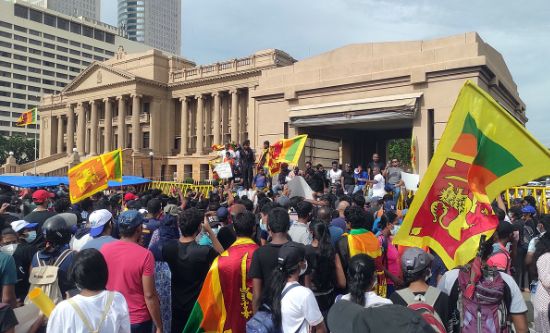
We publish below a statement from the Frontline Socialist Party of Sri Lanka on the current economic and political crisis in the country.
In the unfolding economic crisis of Sri Lanka, the country’s worst economic crisis since independence in 1948, thousands of people are queuing for fuel, cooking gas, food and medicine. This has extended to a political crisis, triggering spontaneous protests on the streets across the island demanding the resignation of President Gotabaya Rajapaksa and the parliament.
Although the government is attempting to paint a picture that this crisis was caused by the Covid-19 pandemic, the neoliberal policies which have been adopted for last seven decades are the main reason for the crisis. According to the statistics 11.7 % of people in Sri Lanka today (up from 9.2 % in 2019) earn less than US$3.20 per day, the international poverty line for lower-middle income countries. Since the current crisis accelerated, the poverty rate is undoubtedly much worse.
The capitalist regime forecasted the imminent economic crisis, and all possible steps were taken to shift the burden of the crisis onto the people, while taking measures to oppress the masses through military force. Recent budget decisions raised concerns that inadequate funds would be allocated to social investment. In the Appropriation Bill for 2022, presented by then-Finance Minister Basil Rajapaksa on 7 October 2021, the Defence Ministry received the highest allocation at 373.1bn rupees (then US$1.86bn), an increase of 33.8bn rupees compared to the previous year, to reach 14.9% of total expenditure. The Health Ministry was allocated 158bn rupees (then $790m), a decrease of 871m rupees from the previous year despite the Covid-19 pandemic.
Furthermore the 20th Amendment to the Sri Lankan Constitution, adopted in 2020, undermined the independence of the judiciary, as well as key institutions including the National Audit Office and the Commission to Investigate Allegations of Bribery or Corruption (CIABOC), by giving the president unfettered control of appointments of senior judges and officials. The amendment also removed the Auditor General’s constitutional authority to audit the Prime Minister’s Office and the Presidential Secretariat, and removed the constitutional status of the CIABOC, meaning it can be abolished by a simple majority in parliament. Sri Lanka’s military has increasingly taken on civilian government functions, including in sectors such as health, development, and agriculture.
The crisis has reached the doorstep of the people. Food inflation hit an eye-watering 30.2% in March. The currency’s 40% depreciation against the US dollar in one month, including a central bank managed devaluation, is blowing out leverage ratios: public debt estimated by the International Monetary Fund at 120% of GDP is some 40 percentage points more than might be deemed sustainable. The price of petrol and diesel has almost doubled in a month. The price of liquefied petroleum gas, commonly used for cooking by residents in urban areas, has tripled this year, forcing people to turn to kerosene. The foreign exchange shortage has also hit essential supplies, including food and medicine. The country’s official reserves fell by $779m to $2.36bn in January 2022 compared with $3.1bn in December 2021. The foreign currency shortage makes it difficult to do things like import food, which is one of the reasons why we’ve seen inflation rise to double digits.
After a demonstration outside the president’s residence on 31 March of people fed up with crippling shortages of essential food and fuel items, the government declared a state of emergency on 1 April, announced a 36-hour curfew from 6pm on 2 April and shut down social media networks for 15 hours the following day. On 3 April, shortly after thousands of people defied the state of emergency and curfew and joined street protests denouncing the government, the entire cabinet – except the president’s older brother, Prime Minister Mahinda Rajapaksa – resigned.
This economic crisis will be getting worse in coming months. There is a $1bn bond repayment due in July. Debt payments of nearly $7bn are due this year. To deal with the worsening financial situation, Sri Lanka has approached India and China for assistance. In January 2022, Rajapaksa met with Chinese foreign minister Wang Yi to request that China restructure its debt repayments. Last year, Sri Lanka’s central bank and the People’s Bank of China entered into a bilateral currency swap agreement for a swap facility amounting to $1.5bn; the move was aimed at reducing the risk of fluctuating exchange rates when there is financial volatility. India has also recently offered credit and foreign exchange support, which includes a $500m line of credit and $1bn loan to help Sri Lanka purchase fuel.
The people’s uprisings are inevitable against the government and the economic recession. The left movement of the country should be able to mobilise the people towards the socialist reforms and to a system change. The current crisis is fertile soil to plant socialist ideologies against the neoliberal agendas. As Frontline Socialist Party we have brought a slogan to the surface demanding a mass movement for system change. The People’s Struggle movement was formed to steer the said mass movement.
Frontline Socialist Party




